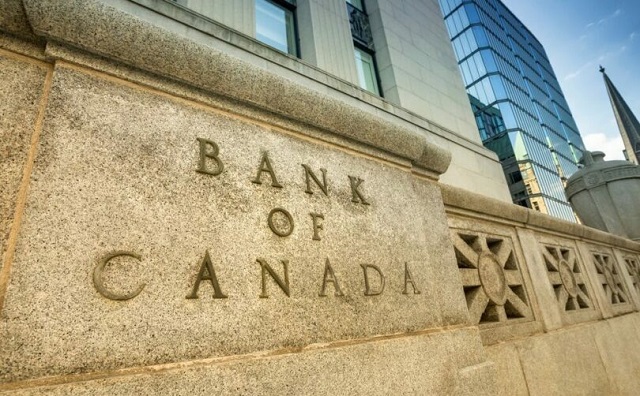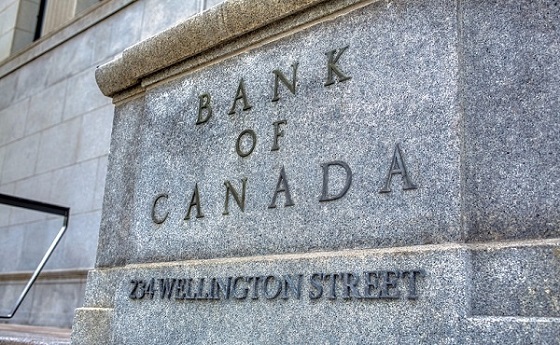Banks
Canadian bankers ask gov’t to let them view private citizens’ tax returns

From LifeSiteNews
In addition to the Canadian Bankers Association, Mortgage Professionals Canada has also requested that it be allowed to view confidential tax records, saying a ‘digital income verification tool is an urgently required fraud prevention solution.’
The Canadian Bankers Association has asked Canada’s Senate banking committee to allow large banks to view people’s confidential federal personal tax returns via electronic access for what it claims is to verify one’s income to combat fraud.
According to Blacklock’s Reporter, the Association’s chief economist Alex Ciappara claims the measure would cut costs while allowing “banks to reduce mortgage fraud that serves to drive up costs for borrowers.”
While mortgage fraud does occur, according to a 2004 report from the Canada Mortgage and Housing Corporation, it is quite rare.
“Fraud in land conveyancing does not appear to have reached crisis proportions in Canada,” said the report.
Ciappara, failing to elaborate on just how this new privilege would reduce fraud, insisted that allowing banks to see one’s gross income would be a “technology-based solution to reduce mortgage fraud.”
While the banks claim that being allowed to view one’s personal tax returns would help prevent mortgage “fraud,” it is not clear what the federal government of Prime Minister Justin Trudeau will do in this matter.
In addition to the Bankers Association, Mortgage Professionals Canada has also requested that it be allowed to view one’s confidential tax records, saying a “digital income verification tool is an urgently required fraud prevention solution.”
Governments allowing banks to access personal tax records is concerning given how the current federal government has a history of intruding on one’s personal finances. An example of this was in 2022, when Finance Minister Chrystia Freeland took the unprecedented step of demanding that banks freeze the accounts of anyone involved in the Freedom Convoy protest in Ottawa, without a court order.
Of note is that similar infrastructure blocking protests have taken place in recent weeks in Canada, over the Israel-Hamas conflict, yet no extraordinary measures have been taken to stop protesters by the Trudeau government.
Should banks be allowed to access one’s personal tax returns, it might not stop at just being allowed to verify one’s income but could extend to making every single transaction searchable.
Freeland is a member of the Board of Trustees for the World Economic Forum (WEF), which is the group behind the now-infamous “Great Reset,” an agenda that critics say seeks to install a global system similar to that of China’s Social Credit System.
One of the WEF goals is to push governments to introduce a digital currency and ID system.
For the time being, it looks like Canada will not get a digital dollar.
The Bank of Canada (BOC) in August said that the creation of a central bank digital currency (CBDC) is not needed as many people rely on “cash” to pay for things, and that the introduction of a digital currency would only be feasible if consumers demanded its release.
However, the BOC did not fully rule out a digital dollar in the future.
As noted in a report from LifeSiteNews, experts warn that central bank digital currencies are a “control tool” of governments.
Conservative leader Pierre Poilievre promised that if he is elected prime minister, he would stop any implementation of a “digital currency” or a compulsory “digital ID” system.
Banks
Scrapping net-zero commitments step in right direction for Canadian Pension Plan

From the Fraser Institute
By Matthew Lau
And in January, all of Canada’s six largest banks quit the Net-Zero Banking Alliance, an alliance formerly led by Mark Carney (before he resigned to run for leadership of the Liberal Party) that aimed to align banking activities with net-zero emissions by 2050.
The Canada Pension Plan Investment Board (CPPIB) has cancelled its commitment, established just three years ago, to transition to net-zero emissions by 2050. According to the CPPIB, “Forcing alignment with rigid milestones could lead to investment decisions that are misaligned with our investment strategy.”
This latest development is good news. The CPPIB, which invest the funds Canadians contribute to the Canada Pension Plan (CPP), has a fiduciary duty to Canadians who are forced to pay into the CPP and who rely on it for retirement income. The CPPIB’s objective should not be climate activism or other environmental or social concerns, but risk-adjusted financial returns. And as noted in a broad literature review by Steven Globerman, senior fellow at the Fraser Institute, there’s a lack of consistent evidence that pursuing ESG (environmental, social and governance) objectives helps improve financial returns.
Indeed, as economist John Cochrane pointed out, it’s logically impossible for ESG investing to achieve social or environmental goals while also improving financial returns. That’s because investors push for these goals by supplying firms aligned with these goals with cheaper capital. But cheaper capital for the firm is equivalent to lower returns for the investor. Therefore, “if you don’t lose money on ESG investing, ESG investing doesn’t work,” Cochrane explained. “Take your pick.”
The CPPIB is not alone among financial institutions abandoning environmental objectives in recent months. In April, Canada’s largest company by market capitalization, RBC, announced it will cancel its sustainable finance targets and reduce its environmental disclosures due to new federal rules around how companies make claims about their environmental performance.
And in January, all of Canada’s six largest banks quit the Net-Zero Banking Alliance, an alliance formerly led by Mark Carney (before he resigned to run for leadership of the Liberal Party) that aimed to align banking activities with net-zero emissions by 2050. Shortly before Canada’s six largest banks quit the initiative, the six largest U.S. banks did the same.
There’s a second potential benefit to the CPPIB cancelling its net-zero commitment. Now, perhaps with the net-zero objective out of the way, the CPPIB can rein in some of the administrative and management expenses associated with pursuing net-zero.
As Andrew Coyne noted in a recent commentary, the CPPIB has become bloated in the past two decades. Before 2006, the CPP invested passively, which meant it invested Canadians’ money in a way that tracked market indexes. But since switching to active investing, which includes picking stocks and other strategies, the CPPIB ballooned from 150 employees and total costs of $118 million to more than 2,100 employees and total expenses (before taxes and financing) of more than $6 billion.
This administrative ballooning took place well before the rise of environmentally-themed investing or the CPPIB’s announcement of net-zero targets, but the net-zero targets didn’t help. And as Coyne noted, the CPPIB’s active investment strategy in general has not improved financial returns either.
On the contrary, since switching to active investing the CPPIB has underperformed the index to a cumulative tune of about $70 billion, or nearly one-tenth of its current fund size. “The fund’s managers,” Coyne concluded, “have spent nearly two decades and a total of $53-billion trying to beat the market, only to produce a fund that is nearly 10-per-cent smaller than it would be had they just heaved darts at the listings.”
Scrapping net-zero commitments won’t turn that awful track record around overnight. But it’s finally a step in the right direction.
Banks
Top Canadian bank studies possible use of digital dollar for ‘basic’ online payments

From LifeSiteNews
A new report released by the Bank of Canada proposed a ‘promising architecture well-suited for basic payments’ through the use of a digital dollar, though most Canadians are wary of such an idea.
Canada’s central bank has been studying ways to introduce a central bank digital currency (CBDC) for use for online retailers, according to a new report, despite the fact that recent research suggests Canadians are wary of any type of digital dollar.
In a new 47-page report titled, “A Retail CBDC Design For Basic Payments Feasibility Study,” which was released on June 13, 2025, the Bank of Canada (BOC) identified a “promising architecture well-suited for basic payments” through the use of a digital dollar.
The report reads that CBDCs “can be fast and cheap for basic payments, with high privacy, although some areas such as integration with retail payments systems, performance of auditing and resilience of the core system state require further investigation.”
While the report authors stopped short of fully recommending a CBDC, they noted it is a decision that could happen “outside the scope of this analysis.”
“Our framing highlights other promising architectures for an online retail CBDC, whose analysis we leave as an area for further exploration,” reads the report.
When it comes to a digital Canadian dollar, the Bank of Canada last year found that Canadians are very wary of a government-backed digital currency, concluding that a “significant number” of citizens would resist the implementation of such a system.
Indeed, a 2023 study found that most Canadians, about 85 percent, do not want a digital dollar, as previously reported by LifeSiteNews.
The study found that a “significant number” of Canadians are suspicious of government overreach and would resist any measures by the government or central bank to create digital forms of official money.
The BOC has said that it would continue to look at other countries’ use and development of CBDCs and will work with other “central banks” to improve so-called cross border payments.
Last year, as reported by LifeSiteNews, the BOC has already said that plans to create a digital “dollar,” also known as a central bank digital currency (CBDC), have been shelved.
Digital currencies have been touted as the future by some government officials, but, as LifeSiteNews has reported before, many experts warn that such technology would restrict freedom and could be used as a “control tool” against citizens, similar to China’s pervasive social credit system.
The BOC last August admitted that the creation of a CBDC is not even necessary, as many people rely on cash to pay for things. The bank concluded that the introduction of a digital currency would only be feasible if consumers demanded its release.
Conservative Party leader Pierre Poilievre has promised, should he ever form the government, he would oppose the creation of a digital dollar.
Contrast this to Canada’s current Liberal Prime Minister Mark Carney. He has a history of supporting central bank digital currencies and in 2022 supported “choking off the money” donated to the Freedom Convoy protests against COVID mandates.
-

 COVID-1912 hours ago
COVID-1912 hours agoOntario man launches new challenge against province’s latest attempt to ban free expression on roadside billboards
-

 Business2 days ago
Business2 days agoWhile China Hacks Canada, B.C. Sends Them a Billion-Dollar Ship Building Contract
-

 Energy20 hours ago
Energy20 hours agoThis Canada Day, Celebrate Energy Renewal
-

 Alberta1 day ago
Alberta1 day agoSo Alberta, what’s next?
-

 Alberta11 hours ago
Alberta11 hours agoAlberta Next Takes A Look At Alberta Provincial Police Force
-

 Bjorn Lomborg2 days ago
Bjorn Lomborg2 days agoThe Physics Behind The Spanish Blackout
-

 Alberta13 hours ago
Alberta13 hours agoCanadian Oil Sands Production Expected to Reach All-time Highs this Year Despite Lower Oil Prices
-

 International14 hours ago
International14 hours agoPresident Xi Skips Key Summit, Adding Fuel to Ebbing Power Theories





